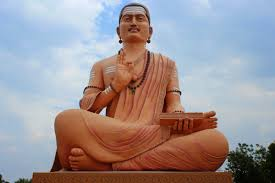Indian History
Basava Jayanthi
- 27 Apr 2020
- 3 min read
Why in News
The Prime Minister greeted the people on Global Basava Jayanthi – 2020 held digitally on April 26, 2020, connecting followers in India and abroad.
- Basava Jayanthi is an annual event celebrated in the honour of the birth of Vishwaguru Basaveshwara, the 12th century philosopher and social reformer who gave a unique spiritual path to mankind.
Key Points
- Basaveshwara was born in Bagevadi (of undivided Bijapur district in Karnataka) during 1131 AD. He is the founding saint of the Lingayat sect.
- His spiritual discipline was based on the principles of Arivu (true knowledge), Achara (right conduct), and Anubhava (divine experience) and it brought social, religious and economical revolution in the 12th century.
- This path advocates a holistic approach of Lingangayoga (union with the divine). This comprehensive discipline encompasses bhakti (devotion), jnana (knowledge), and kriye (action) in a well balanced manner.
- In Kalyana, the Kalchuri king Bijjala (1157-1167, AD) appointed Basaveshwara as a karanika (Accountant) in the initial stage, in his court and later as the Prime minister.
- Here, Basaveshwara revolted against all the social evils of the traditionalistic society and brought a drastic change in various facets.
- His practical approach and act of establishment of ‘Kalyana Rajya’ (Welfare state) brought a new status and position for all the citizens of the society, irrespective of class, caste, creed and sex.
- Anubhava Mantapa:
- He established the Anubhava Mantapa, which was a common forum for all to discuss the prevailing problems of socio, economic and political strata including religious and spiritual principles along with personal problems.
- Thus, it was the first and foremost Parliament of India, where Sharanas (citizens of welfare society) sat together and discussed the socialistic principles of a Democratic set up.
- All those discussions of Sharanas were written in the form of Vachanas.
- Vachanas were an innovative literary form written in simple Kannada language.
- Basaveshwara gave two more very important socio-economic principles. They are:
- Kayaka (Divine work): According to this, every individual of the society should take up the job of his choice and perform it with all sincerity.
- Dasoha (Equal distribution):
- There must be an equal income for equal work.
- The worker (Kayakajeevi) may lead his day-today life by his hard earned income. But he should not preserve the money or property for tomorrow. He must utilise the surplus money for the society and poors.
- On 14th November 2015, the Prime Minister of India inaugurated the statue of Basavanna along the bank of the river Thames at Lambeth in London.






